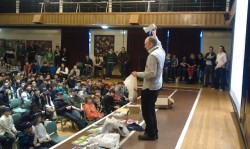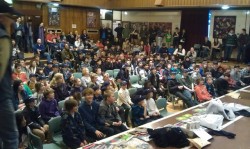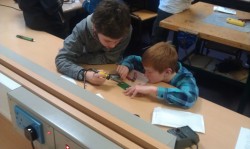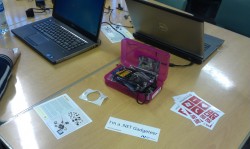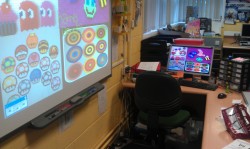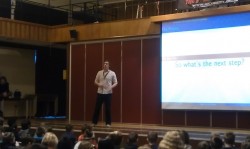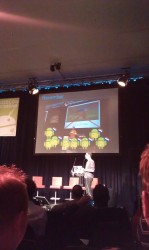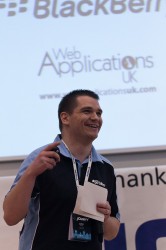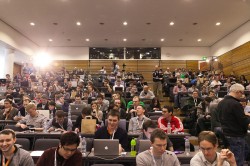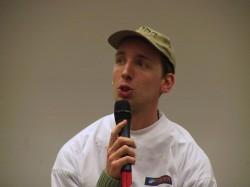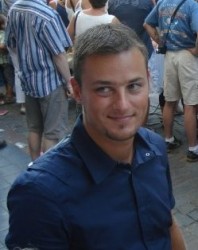 I’ve been to a lot of unconferences in my time, but none with any level of excitement to match Hack To The Future!
I’ve been to a lot of unconferences in my time, but none with any level of excitement to match Hack To The Future!
The event, created by Alan “@teknoteacher” O’Donohoe, was a massive opening salvo to highlight the recent UK Government announcement that the ICT curriculum is changing from September 2012. Alan successfully brought together children, businesses and enthusiasts to produce 40+ talks and workshops on the day.
I loved the mix of workshops and sessions, children loved the hands on experience of using electronics in the lab, I saw many children sitting down and learning to solder with the Fignition team, Julian and Helen did a fantastic job of engaging with the children (and the adults who were fighting to get their hands on the tiny 8-bit computer) and illustrating that electronics can be fun.
Children also enjoyed creating their own hama bead creations, a session lead by a 12 yr old girl. Adults sat side by side with children and learnt how to make various badges and figures (There were quite a few 8-bit and 16-bit game character creations coming out of that workshop.)
The children were given free reign to choose what talks they wanted to see, and used handy mini maps and mini grids to record when and where a talk took place.
On the day, the BBC unveiled a very early pre alpha build of their new coding platform, dubbed the BBC Micro II. This platform allows beginners to learn how to code, and then their source code can be compiled for many different platforms. It’s still early days, but it is a fantastic premise, and one which I will follow with great interest.
At the end of the day, Dr Tom Crick presented the closing keynote, that the purpose of the day was to excite and inspire children and adults to make a difference in the ICT curriculum, highlighting that the event is the start of many similar events around the UK, and indeed the world.
This event was fantastic, and I recommend it to children and adults, you can learn so much, just by having fun. If you would like to learn more, visit their lanyrd page.
Big thanks to Josette and O’Reilly for providing gifts and prizes for all of the children.
Johan Pelgrim is a Mobile Software Engineer, specialized in Android. Everybody who is working in the Mobile industry knows that the mobile world is a very dynamic and high demanding one. Besides his day-job Johan is a father of three kids with ages 1, 2 and 4 years, and yet in the fall of 2011 Johan thought it was a good idea to start the Dutch Android User Group. An interesting question is why he started the user group and this was his answer.
The timing was right.
 There already were a couple of initiatives to start a Dutch Android user group in the past, but none made it through. When asking around some group leaders said there group is still active, but appeared to be pretty dormant in my opinion. There is a very active Mobile community in Amsterdam, but not one with a nationwide spread nor a sole Android focus. Last year The Netherlands had its first serious Android conference under the droidcon label and that triggered me to start the user group.
There already were a couple of initiatives to start a Dutch Android user group in the past, but none made it through. When asking around some group leaders said there group is still active, but appeared to be pretty dormant in my opinion. There is a very active Mobile community in Amsterdam, but not one with a nationwide spread nor a sole Android focus. Last year The Netherlands had its first serious Android conference under the droidcon label and that triggered me to start the user group.
I sensed a lot of passion around me.
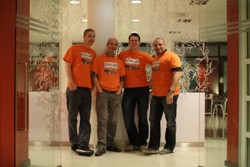
The Dutch organizers: Arno den Hond, Dennis Geurts, Johan Pelgrim and Wiebe Elsinga
I didn’t want to do this all by myself. From the start I knew that people wouldn’t buy into my initiative if it was just me. Besides that, where would I find the time and sponsors to organize all this. I needed to gather a couple of enthousiastic people around me who shared my vision that starting this user group was a good idea and to give the leadership team a lot more body from the get go. I specifically searched people working at different companies and sollicited sponsorship from these companies as well, in terms of small payments and hosting of meetups. Within a couple of days Wiebe Elsinga and Arno den Hond joined me, followed by Dennis Geurts a few weeks later.
The launch at droidconNL november 2011
I was involved in the organisation of droidconNL in November 2011. All in all around 400 Android professionals visited the two-day conference and I had an opportunity to launch our initiative in a 10 minute pitch, just before the keynote by Nick Butcher, Android developer advocate at Google. I felt very lucky and Bill Mote, a good Android friend of mine, living in Cincinnatti and organizer of the “Cincinnatti Android Developers Group“, quoted Seneca, a Roman philosopher from the 1st century, saying: “Luck is what happens when preparation meets opportunity.” And he was right (both Bill and Seneca ;-). Of course I was lucky to be standing there, but it was an opportunity which I helped create. Richard Hyndmann, another Google Android developer advocate, posted a picture on his Google+ stream stating “The birth of something awesome”
In the closing keynote Richard Hyndmann had a slide with a picture of me at my pitch and with an animation added a lot of android mascottes in the frame, stating I was not alone anymore. That helped sink in the idea that we had started something big and the group is growing steadily ever since. We had around 50 members the first month. That doubled in the second month and with that same pace, after just four months we recently welcomed our 200th member. When we started the user group we had no idea how big this was going to be, but seeing the steady growth I think we are heading for a great first year!
The first meetup
Our first meetup had the theme: “From idea to App” and we invited a User Interface (UI) / User eXperience (UX) desinger, an experienced Android Developer and someone with experience how to improve your app and make it visible in the Android Market.
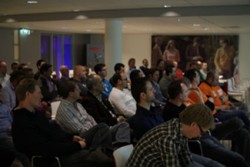
The audience at our first meetup
All in all we had around 65 people on our first meetup and we had a blast. Of course we had to get to know each other, since it was our first meetup, but during the walk-in, coffee- and dinner breaks and the barcamp – there was a buzz. Everbody was talking to each other and no one was left out. Everybody had a story to tell and was finding an eager audience to listen to their story and lard it with their own experiences and anekdotes. There was a lot of energy during the first meetup and maybe that was the biggest win for the first meetup and the user group, getting to know each other and share thoughts and ideas.
Nothing to loose, much to gain.
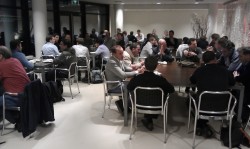
People tallking to each other during dinner
Yes, starting a user group and organizing meetups will cost you a bit of time, but in my opinion it doesn’t outweigh the enourmous positive energy and feedback you get in return. One of the members sent me an e-mail with the text: “Your enthousiams is working very contagious“. That was maybe the biggest compliment I could get and that is what is making me tick, help creating an environment where the Dutch Android professional can inspire and be inspired by others. Nothing more, nothing less.
The future
Our future is looking pretty bright. I could have said pretty busy, but has a negative ring to it, in my opinion. Our first goal was to host bi-monthly meetups but we are now in the process of one per month. It’s hard to hold back all the enthousiasm of our members to host meetups or join external events. There is a lot happening in the mobile industry in the Netherlands and we are in the very middle of it!
It seems that I am just writing about events at the moment – but you have to admit they are good events that should help you professionally.
 Those lovely people over at S&S Media have announced their latest London event – Mobile 360 Live, running April 2nd & 3rd. These are the guys behind JAX London, and the Mobile TechCon series in Germany, so we can say with honesty that they know a thing or too about cool developer focused events.
Those lovely people over at S&S Media have announced their latest London event – Mobile 360 Live, running April 2nd & 3rd. These are the guys behind JAX London, and the Mobile TechCon series in Germany, so we can say with honesty that they know a thing or too about cool developer focused events.
Mark Hazell at S&S tells me that he wanted to create something that allowed developers of all types of mobile content to come together in one place, to counter the fact that so many mobile dev events in the UK until now have had a siloed, single platform focus.

Paul Ardeleanu

Marko Gargenta
Mobile 360 Live has 5 tracks covering iOS, Android, Mobile Web, Platforms and Mobile Business. It also has a hands-on development workshop day, with people like Paul Ardeleanu and Marko Gargenta encouraging attendees to get their hands dirty coding apps.
Should you be an app developer on the iPhone, Android, Windows Phone 7, or mobile web, you will definitely gain something from the rich talks organized with you in mind. The business side has not been forgotten with topics on Mobile Commerce & Payment, Tablet Solutions, Marketing & Trends, Mobile Business Solutions.
S&S is offering tickets for only £150 if you’re fast.
Check out www.mobile360live.com for more.
 Last week White October hosted our first technical conference, jQuery UK 2012 for 320 web developers in Oxford. It turned out to be a success beyond our greatest hopes with overwhelmingly positive feedback from delegates and speakers alike. However, the smoothness of proceedings on the day belies the huge challenges we faced in putting it together, and the financial risks it placed on our small web agency.
Last week White October hosted our first technical conference, jQuery UK 2012 for 320 web developers in Oxford. It turned out to be a success beyond our greatest hopes with overwhelmingly positive feedback from delegates and speakers alike. However, the smoothness of proceedings on the day belies the huge challenges we faced in putting it together, and the financial risks it placed on our small web agency.
 The conference was the brainchild of John Wards, White October’s Technical Director. Experimenting with the latest web technologies is ingrained our agency culture, and so hosting a tech conference felt like a natural next step for us – an outward expression of our inward dedication to messing around with the latest cool stuff!
The conference was the brainchild of John Wards, White October’s Technical Director. Experimenting with the latest web technologies is ingrained our agency culture, and so hosting a tech conference felt like a natural next step for us – an outward expression of our inward dedication to messing around with the latest cool stuff!
What we found in John, and what John probably found in John, was a natural flare for curating a conference. His ballsy approaches, first to the jQuery team, and then to sponsors were undoubtably what made the conference – the cracking speaker line-up kept everybody happy all day, and the financial support from some great sponsors including Nokia and Blackberry gave us the freedom to go to town on some of the finer details which make a day memorable.
We realised from the start that we are a web agency, not event organisers, and we would require some help to take on an event of this scale. We found a fantastic partner in the form of Sarola Events who provided astute advice throughout, and showed the patience of saints in dealing with our novice questions and concerns.
We were also lucky to have Becky on our team who had been involved in running events on this scale before. She was the only voice in the agency sounding a note of caution as we committed to the conference, because she knew the scale of the challenge we were embarking on. But her experience and natural attention to detail proved invaluable as she meticulously planned, designed and procured every asset we needed, from banners and table clothes, to toilet signs and lanyards. You have to think of everything when you put on an event like this, and we had endless discussions covering topics such as: preventing queues that would divide the foyer; the volume of music at the after party (pro tip: quiet enough to allow easy networking); the ratio of men and the availability of men’s toilets; minimizing queues at lunch; walk-in music and its necessary qualities; getting enough light for videos; how to hang banners on the pillars; the best arrangement of sponsor stands. The list was endless.
All of this, plus the production of assets including the website and all of the conference goodies, imposed a huge workload on our small agency. The disruption was two-fold: the conference work displaced paying client-work representing a real impact to the business, and the attention it required interrupted the flow of our projects with key people dragged off to hit its immovable deadlines. To date we have clocked up nearly 600 man hours. Billed at our day rate that time would be worth over £40,000 to us and although the real cost to our business of that time probably lies somewhere between £20k and £30k. Added to all of the other costs – hotels, flights, printing, merchandise, catering, venue hire and Sarola’s fees, and the event has certainly ended up losing us a few thousand.
Am I upset or concerned about this? Not at all – the benefits to White October are numerous and substantial. Besides the obvious raised profile and contacts we made, the pride and self-belief that it has inspired in all of us is probably the most gratifying outcome for me as the business owner.
At the after party I joked to John that after this success we should start planning the next one. “I have already”, came the reply, “I’ve got a name, list of speakers, list of sponsors and a budget spreadsheet.”. So I guess you should watch this space.
Find out more:
- The jQuery UK event site
- White October’s site
- A collection of tweets about the conference
- Christian Heilmann’s blog post about the conference
 The 12th edition of FOSDEM, the Free and Open Source Software Developers’ European Meeting, took place on the week-end of 3rd and 4th February. It’s now an established, recognised yearly event that attracts participants from all over Europe, and even the world. Let’s take a look at how it came to be.
The 12th edition of FOSDEM, the Free and Open Source Software Developers’ European Meeting, took place on the week-end of 3rd and 4th February. It’s now an established, recognised yearly event that attracts participants from all over Europe, and even the world. Let’s take a look at how it came to be.
In 2000, the Free Software and Open Source movements were getting growing interest from the corporate world, and commercial event were organised, amongst others in Paris. I visited those events, and although there was space reserved for the community, I felt these events lacked something. It was not the right place for hackers to meet and learn from each other. And that was the start, end of November 2000, of a great adventure that caught me by surprise. Before I realised it, I had people around me enthusiastic about the concept and there was a website and a mailing list set up. But what would the event be called?
OSDEM: Open Source Developer’s European Meeting (it would later be renamed to FOSDEM to make justice to the Free Software movement). The date was also set: 3 and 4 February 2001, just after the commercial Linux conference in Paris, in the hope to attract visitors and, who knows – speakers. But this meant that there were only 2 months left to organise the event!
The good news accumulated: Richard Stallman accepted to come and talk after his visit to Paris, Renaud Larsen from VA Linux enthusiastically supported the event and brought sponsoring and speakers (for example Rasterman and Jeremy Allison), Damien Sandras, of Ekiga fame, joined me in organising the event, and others also brought their support. Those were crazy weeks. Before you organise your first event, you can hardly imagine all what’s needed: booking hotels, finding the event location, ensuring you have the needed facilities, providing the network, looking for and inviting speakers, deciding on their talk’s topic, updating the website, promoting the event, etc…
When the great day arrived, we didn’t know how many people to expect.
We expected quite a lot of people, but not the 600 that did show up!
The organisation had its quirks, but everybody present was patient and ready to help if possible. Spontaneously, a team formed to welcome visitors and help people find their way. This was the beginning of what would become the FIT: the Fosdem Info Team.
Organising a great event is cool, this needed to be repeated. But confirming a success is hard, as we experienced for the second edition. VA Linux was not sponsoring anymore, and new sponsors were needed. These were hard to find, bringing some disappointment. My first mails to O’Reilly went lost, leaving me without sponsors! I still remember when I finally got Josette, O’Reilly UK Ltd, on the phone. Before calling her I said to colleagues: “This is the last chance to have a second edition…..”. Luckily she accepted that O’Reilly supports the event, and the ball was rolling again. Since then, the event organisation improved continually (a traditional pain point was the Wifi network, taking 3 or 4 editions to be fixed) and the event popularity grew constantly.
This year was the first time it was difficult for me to go to the event as a visitor (I left the organisation in 2009). I didn’t feel at my place as a visitor. However, the energy you really feel at FOSDEM got me over it. The energy even gave me an idea of what I could bring to the community. I hope you’ll hear about it soon, but more importantly, I encourage you to be present at FOSDEM 2013, and I hope you too will feel the energy and decide to bring something to the wonderful community of Free and Open Source Software Developers!
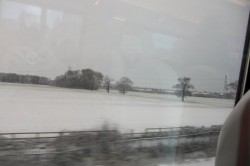
On the train to Oxford
 It snowed all night, how am I going to get to Oxford? It is not far but getting out of the village could be a problem. Worries over, I made it – a little late but I got there. The conference is held in the Said Business School which is part of the University of Oxford. I suppose the difference is that the Business School is a modern, light building not to be compared with the old, charming colleges. I have got only 12 boxes of books but my table is a little small – I need to be very creative with my display.
It snowed all night, how am I going to get to Oxford? It is not far but getting out of the village could be a problem. Worries over, I made it – a little late but I got there. The conference is held in the Said Business School which is part of the University of Oxford. I suppose the difference is that the Business School is a modern, light building not to be compared with the old, charming colleges. I have got only 12 boxes of books but my table is a little small – I need to be very creative with my display.
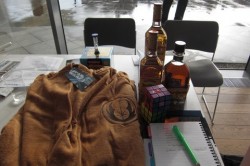
TQUILLA goodies
There are a few exhibitors including – Blackberry, Kendo UI, Twilio but the most amazing stand is TQUILA – as you can see on the photo there display was very appealing particularly on a cold day.
I know only one of the speakers – Christian Heilmann from Mozilla who talked about “Embracing and Celebrating Redundancy” – a very topical subject but I am not sure if it is the right context. Was he in the right conference? Other speakers included Tod Parker, Paul Irish, Jorn Zaefferer, Adi Osmani, Ralph Whitbeck, Doug Neiner, Dion Almaer and Ben and Haymo Meran.
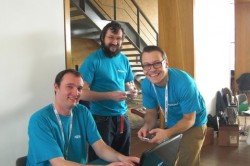
Some members of the White October Team
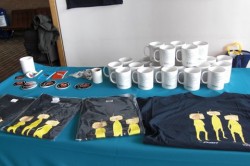
Goodies from White October
The organisers, White October, the guys with the most beautiful t-shirts, perl colour. What do you I know about White October – not much but I am hoping that they will write a post for us giving us the ups and downs of organizing a big event and running a very successful company at the same time.
 Hack to the Future, is a new event for 2012. The brainchild of Alan O’Donohoe, an ICT Teacher from Preston, United Kingdom. Alan is passionate about computing, and has gathered a large following since the announcement of impending changes to the UK’s ICT curriculum.
Hack to the Future, is a new event for 2012. The brainchild of Alan O’Donohoe, an ICT Teacher from Preston, United Kingdom. Alan is passionate about computing, and has gathered a large following since the announcement of impending changes to the UK’s ICT curriculum.
Alan’s idea is simple, host a barcamp in his school, and invite 200 children to attend. But what he has done differently to other events is that he has invited 100 mentors, from different roles in the IT community to lead workshops and talks on their specialist subjects. For example Microsoft will be there showing off their new Gadgeteer, Andy Piper will be demonstrating Nanode, a device which is similar and compatible with the Arduino platform. There will be games designers, artists, programmers and lots more for children to learn from.
These mentors are donating their time free of charge, providing first hand knowledge on their specialist subjects. This is a great chance for children to learn key skills, and use this information to make informed choices for their future academic studies, and their career paths.
The event model is also totally open source, and other potential event organisers are encouraged to read the wiki and improve the event with each iteration of events. There are already discussions about taking the event around the UK, so keep an eye out for one near you soon.
There’ll be a full write up on the blog after the event, but please keep an eye on our twitter hashtag before, during and after the event. From there you can watch a live stream of the event, listen to interviews with mentors and much more.
My thanks to Josette and O’Reilly for providing a selection of books, magazines and an free ebook voucher for every attendee! WOW!!!
On the way to FOSDEM.
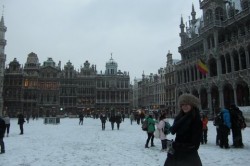
La Grand Place under the snow
Cold morning, need to de-ice the car… At long last got as near as possible to Reading station. What a mess! Allegedly, it will be brilliant in a few years time. Now to platform 5 for the train to London. Oops! Sorry no platform 5. It does not exist anymore – it is now called platform 8. I wish I was in King’s Cross and took the train on platform 9 & 3/4 And hopped through the wall but no, I am on the now platform 8 of Reading station waiting for the 7.57 train to Paddington. Technical problems in Maidenhead, the fast train is now taking 50 mn instead of 25 – I have got time, no problem, just a pity I could not find a seat. At long last got to the Eurostar station, breakfast at the Pain Quotidien with my colleague, Clair – nice. Now in the train, can see a few techies around so we will not be alone at the Universite Libre. I must be terrible company … Clair is fast asleep.
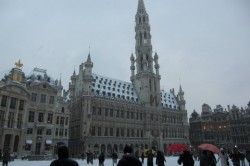
La Grand Place under snow (2)
Made it to Brussels – Clair is awake. Now hotel and lunch. Eating mussels and chips as one must in Brussels, we soon realised that it was snowing. Fosdem under the snow – that’s a first. Part of me love it, my other side worries that nobody will come to Fosdem. La Grand Place under snow is wonderful – yet another Christmas card. First fall – could it be the last? Dinner with some friends and a quick visit to the Delirium – just a quick visit, without beer, to show Clair what it is about. As I am sure you know, the Delirium is the drinking place where lots and I mean lots of Techies meet on Friday night. A great place to network, meet your friends and of course drink the best beer in the world – so they tell me but not the place to go to if you need to work early the next day.

The Chocolate quest
Saturday morning – bleak. It is cold. Taxi to the university with some friends. Sylvia and Bogomil offered
their help with setting up the book tables… only 50 large boxes of books. Will we be ready on time? Of course, I should have more faith. Everything was ready on time – now we just wait for the customers. Fosdem has changed a lot this year, a new building has been added – building K. All the stands have been moved to building K except for the information/registration booth and the O’Reilly stand. I have got twice as much space as previous years (will soon need a bike to get from one side of the stand to the other). It is cold, it is freezing … Keep moving even if you look silly. We have all heard of the Fosdem dance (if not I am sure you can find it online) but have you heard of the frozen dance on the O’Reilly stand? Please shut the door! The day went well, sold a reasonable quantity of books, met lots of friends from France, Italy, Spain, Greece etc. The bad weather does not seem to have stop people to come.
The K building, unfortunately I did not have a chance to see it but apparently it is new, heated, large (plenty of space for all the stands) etc. Next
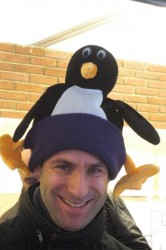
Surprise!
year we might all move there… but will you find us? Fosdem without you is not Fosdem! Will let you know what’s happening in a future post.
Sunday, still bleak, still icy but a different kind of a Sunday at Fosdem. Usually Sunday is the day of rest, even for us. We have time to sit down and have a little chat but not this Sunday. I don’t think we sat once during the 2 days. I did however got the most beautiful back massage – thank you friend, please come back next year :)
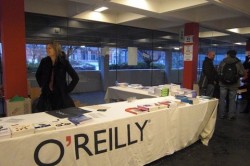
The End
As I am sure you are aware I like Fosdem a lot. It is where you meet all your old friends. Not only do you hear about the latest developments, you hear the latest news, the most important news. What is more important than to hear about the birth of Viktor or Alexandra. We won’t publish a book about these events but I still believe that they are the most important events of our world and they are the key to our future.
To the organizers I shall just say a big thank you for organizing this mammoth task called FOSDEM. How do you coordinate 429 speakers and so many tracks etc? Chapeau!
ACTA is raising its head whilst SOPA and PIPA are on hold!
In March 2010 we were told that:
“EU Parliament rejects ACTA in 663 to 13 vote for openness – MEPs demand talks are open to public scrutiny”
And now we are told:
EU parliament formally adopts controversial ACTA copyright treaty -The Anti-Counterfeiting Trade Agreement must now be upheld by national governments
By Jennifer Baker | IDG News Service | Published 09:30, 27 January 12
But Jennifer Baker also wrote in the same article:
Although the agreement has been signed, it still has to go through a ratification procedure in the EU. But now, shortly after SOPA sponsors succumbed to pressure to revise the bill, digital rights groups and so-called hacktivists are pushing hard for the European Parliament to reject ACTA.
And during that time:
European Parliament Official In Charge Of ACTA Quits, And Denounces The ‘Masquerade’ Behind ACTA
from the wow dept (Mike Masnick)
“This is interesting. Kader Arif, the “rapporteur” for ACTA, has quit that role in disgust over the process behind getting the EU to sign onto ACTA. A rapporteur is a person “appointed by a deliberative body to investigate an issue.”
And
Dutch ISPs Refuse To Block The Pirate Bay
Two large ISPs in the Netherlands have said they will not be blocking subscriber access to The Pirate Bay, as demanded by the Hollywood supported anti-piracy outfit BREIN. T-Mobile and KPN argue that blocking websites is a threat to the open Internet, and suggest that the entertainment industry focuses on new business models instead. BREIN is now expected to take the ISPs to court.
Should you wish to say “NO” to ACTA, there are several petitions to signs including Avaaz which has collected over 1 million signature as I am writing this post.
What are your views? Don’t hesitate to write a comment.
 Why is the Scottish Ruby Conference so popular – is it Edinburgh? Is it the whisky? Or is it because of the dads? Read on and find out who is behind the conference. I manage to get responses from two of the organizers, which is pretty good going since they are supposed to put up the next show in June 29th-30th.
Why is the Scottish Ruby Conference so popular – is it Edinburgh? Is it the whisky? Or is it because of the dads? Read on and find out who is behind the conference. I manage to get responses from two of the organizers, which is pretty good going since they are supposed to put up the next show in June 29th-30th.
Who are you? What do you do?
 Alan:
Alan:
My name is Alan Francis and I work for LivingSocial in Scotland and Washington, DC. At the moment I build iOS and Ruby apps for the sales team.
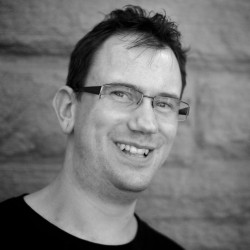 Graeme
Graeme
I’m Graeme Mathieson and I’m currently working for FreeAgent here in Edinburgh, Scotland, which provides an online accounting system designed specifically for freelancers and small businesses. My focus in FreeAgent is on maintaining and enhancing the core accounting engine which is, naturally, built in Ruby.
How did you get into technology?
Alan:
My dad brought home a Sinclair ZX81 (1K RAM!) when I was about 10. He was using it for an Open University course but I loved playing with it. I started writing games for it and graduated to a Sinclair ZX Spectrum (48K!) and then an Amstrad PC when they became available.
When the time came to fill out my University application form, I’d just been to visit a friend who was studying Computer Science at Stirling University. He seemed to be having a good time and so I applied for CS courses. I ended up at Napier University and was taught COBOL and C. I taught myself C++ and that’s the point, I think where I started to really get into what I was doing.
Graeme:
My dad (it’s always the dad’s fault, right?) was a maths teacher at a nearby high school. He’d regularly bring home a BBC Model B at weekends and over holidays. As with most kids, I started out playing games (Chuckie Egg, the Repton series and Donkey Kong still bring back fond memories), but then I started wondering how I could build these sorts of things myself.
I remember spending long Saturdays with my dad reading code printed in Acorn User, while I typed it in, and my mum (who’s not a programmer by any means, but a great proof reader!) would spot the errors. Hours of effort to play a simple game — not quite like downloading the latest title from Steam! — but it was awesome. Then I’d tinker, modify the game’s source code, change the behaviour a little, see what happened.
I guess is all just carried on from there…
 How did you get into Ruby/Ruby on Rails?
How did you get into Ruby/Ruby on Rails?
Alan:
Hm. Long story :-) Some bits and pieces.
a) In 2001 I joined a US company called ObjectMentor doing training and consulting in Extreme Programming (the term Agile hadn’t quite been invented yet). One of my students there was a guy called Chad Fowler. We stayed in touch. He ended up being quite a big name in the Ruby community.
b) I’d loved Dave Thomas and Andy Hunt’s book “The Pragmatic Programmer” and their next book (in 2001) was the first edition of “The Ruby Programming Language”. Hadn’t used the language but I liked the writing style.
c) Around 2002, lots of people in the XP/Agile community started raving about Ruby – Martin Fowler, Dave Thomas, Ron Jeffries
d) In 2005 I was at ThoughtWorks in Australia and Jon Tirsen started talking about Rails. Rails was really the “killer app” that convinced me (and a lot of other people) to get into Ruby.
Graeme:
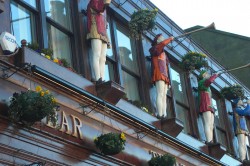 I’m a relative newcomer to web development; up ’til 2004, I’d been doing embedded development in C/C++. I took a job building a web app in Python with the Zope web app framework, which was probably the best (only?) Python web framework at the time.
I’m a relative newcomer to web development; up ’til 2004, I’d been doing embedded development in C/C++. I took a job building a web app in Python with the Zope web app framework, which was probably the best (only?) Python web framework at the time.
After a year or so battling with Zope, I bumped into an early release of Ruby on Rails. It immediately solved a whole bunch of pain points I’d been suffering with Zope — built in database migrations, a proper object/relational mapper (which doesn’t suit all problem domains, but would have in this case) and a much easier deployment story. I prototyped a replacement to our existing Python code based in Ruby on Rails over a weekend and presented it to the management team. They didn’t go for it, but I was so sure that Ruby was the way forward that I quit and started my own Rails consultancy, Rubaidh.
Rubaidh was a clever, but terrible, name for a consultancy. It’s Scots Gaelic for “Ruby”, which gave me the neat tagline of “Scottish for Ruby [on Rails]”. Trouble is, nobody could spell it or pronounce it, and Google kept asking if it was a typo for “rubbish”! Still, I managed to develop a good enough reputation that I was kept busy with Ruby projects for the next few years.
In 2008 you organised Scotland on Rails. What prompted it?
Alan:
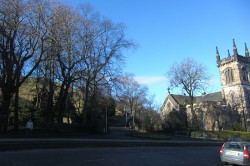 At RailsConf Europe in 2006 Dave Thomas showed the Paris on Rails logo and I liked it. I asked a friend to design me a “Scotland on Rails” logo using the St Andrews Cross. To show the logo off I registered a scotlandonrails.com domain. I had no idea if it would be a user group, a blog or my own consulting company (I was self employed at this point).
At RailsConf Europe in 2006 Dave Thomas showed the Paris on Rails logo and I liked it. I asked a friend to design me a “Scotland on Rails” logo using the St Andrews Cross. To show the logo off I registered a scotlandonrails.com domain. I had no idea if it would be a user group, a blog or my own consulting company (I was self employed at this point).
I printed up a few shirts and sent them to friends (including Chad Fowler)
When the local Scottish Ruby Group decided to hold a small one-day conference we figured we’d just use the name and logo for that. It was a Ruby conference, not Rails specifically, but the name was catchy so we figured why not?
The original idea was just a “get together” where we all presented to each other…but I asked Chad to come over and “keynote” it. Everything kind of snowballed from there and a lot of my US friends were keen to come (because Scotland is cool!). Before we knew what was happening we had all kinds of well-known speakers.
Graeme:
I started the Scottish Ruby User Group in 2007 because I wanted to go to the pub and chat with other people that used Ruby. At one of the pub meetings — after several beers, I’m sure — we got talking about holding a one-day event to get Ruby people from all over Scotland together (despite it being the “Scottish” Ruby User Group, it was largely Edinburgh-based). Alan had a domain and logo ready to go already, so we ran with it. It turned out to be something much bigger — and better — than we expected!
From Scotland on Rails to the Scottish Ruby Conference – why this change of emphasis?
Graeme:
As Alan says, we were always a Ruby conference, we’d just attached ourselves to the conveniently registered domain name. However, the perception was (naturally) that we were specifically a Rails conference and we wanted to correct that.
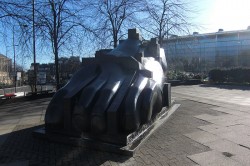 How do you explain the popularity of the Scottish Ruby Conference? Today (23rd January) there are only 14 tickets left for purchase – that’s almost sold out 5 months before the event.
How do you explain the popularity of the Scottish Ruby Conference? Today (23rd January) there are only 14 tickets left for purchase – that’s almost sold out 5 months before the event.
Alan:
Edinburgh is very much a destination city. It was supposed to be a local conference but it’s ended up mostly replacing the O’Reilly RailsConf Europe, which kind of disappeared. It is the biggest Ruby conference in Europe, I think.
Graeme:
I’m sure it’s nothing to do with the conference, and all to do with it being in Edinburgh, Scotland. :-) We’re lucky being in a city (and country) that people just love to visit. I know a lot of our attendees take the opportunity to extend their stay for a week or two and explore the rest of the country. I gather whisky is quite a draw, too.
Where do the attendees come from?
Alan:
All over. We regularly have many speakers and attendees from the UK, Europe, and the US. We’ve had people come from Japan, Australia, New Zealand and South Africa.
Graeme:
Aye, what Alan said. I haven’t run the stats for the past two years, but IIRC (bother, I can’t find the spreadsheet now!) in 2009 we were roughly 25% Scottish, 25% from the rest of the UK and 50% from foreign lands.
Most languages have several frameworks, are there any competitors to Rails?
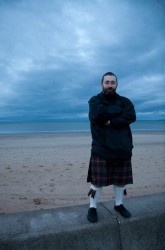
Alan being very Scottish - (c) Jeremy Hinegardner
Alan:
Only smaller things like Sinatra. The big competitor Merb was merged with Rails for Rails 3.
Graeme:
There are a bunch of modular building blocks that make up Rails, and one of the bits it leverages is Rack, a generic way of plugging web servers (Thin, Mongrel, Unicorn, etc.) into web development frameworks. This is awesome because it means you can choose the right framework for the right bit of your app. There are a few to choose from including Sinatra, Camping and Ramaze.
To me, though, the really interesting alternatives are the EventMachine-based asynchronous ones: Goliath and Cramp.
I often hear people comparing Ruby on Rails to PHP – I always thought that PHP is a language and Ruby on Rails a framework, so how can they be compared and why?
Alan:
They’re both ways to make web apps. It’s possible to make a basic webapp in PHP with no framework and people did. Not many people built webapps in Ruby without Rails.
Graeme:
Ruby is the language and Rails is a web development framework, in the same way as PHP is the language and, say, Cake, is the web development framework. The key difference from that perspective is that loads of people seem to develop in PHP without the aid of a framework or, when they realise they need a better structure, invent their own framework. If Apache had shipped with a mod_ruby that allowed it to serve ERB templates directly, the same might have been true of Ruby!
A few years ago, everybody was talking about Rails, the hype seems to have slow down. Can you say why?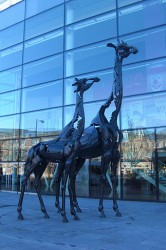
Alan:
I have a long and boring theory about that. I think these ideas in computing move in cycles, all attempting to tackle the problem of “better software” from different angles. We had Objects, Design Patterns, Agile, Rails and the same people moved through them… you see the same names in the Design Patterns movement of the 80s moving into Agile and then into Ruby/Rails.
Each time the new “thing” makes a big wave and over time we ride that as far as we can until it is not making thing much better. At that point, the hivemind shifts to another vector. We’ve had language (Smalltalk), Design (OO/Patterns), Process (XP/Agile) then language again (Ruby/Rails). The next *big* thing might be design again (functional vs OO) or a new kind of process. Who knows, but I think we know that we can’t “Make Software Better” by making incremental improvements to Rails any more.
Graeme:
Part of what attracted me to Rails in the first place was its simplicity — at the time I could keep most of the Rails source code in my head and happily hack on the core to suit my needs. In the past 7 years, though, it has grown and has become significantly more complex (because it’s solving problems for more people in more domains at larger scale). I think Alan’s idea of cycles fits in here, too: in the early days, I’m sure Java was a relatively “simple” way to build web applications. However, over time it grew in size and complexity as more people joined the community and wanted it to solve their corner cases. Then came Rails, which was simple and lots of people got excited about it.
I wonder what’s next? If it’s a Ruby web development framework, I bet it’s one of the asynchronous ones. Maybe it’ll be NodeJS? (Personally, I hope not — I’ve no real love for Javascript!
Now tell me – what make the Scottish Ruby Conference so successful? Could it be just the hard work that Alan, Graeme and Paul (absent for this interview) do?

